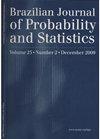重温Samejima–Bolfarine–Bazán IRT车型:新功能和扩展
IF 0.5
4区 数学
Q4 STATISTICS & PROBABILITY
引用次数: 2
摘要
. 2010年,Bolfarine和Bazán(2010)在贝叶斯方法下引入了Samejima-Bolfarine-Bazán (SBB)项目反应理论(IRT)模型。这些模型扩展了常规贝叶斯一参数和二参数Logistic IRT模型,通过加入一个参数来说明项目特征曲线(ICC)的不对称性,即项目的复杂性。它包括(Samejima, 2000)最初提出的Logistic正指数(LPE) IRT模型和LPE的反映(RLPE)。在本工作中,通过马尔可夫链蒙特卡罗(MCMC)算法,包括参数估计和模型比较,开发了SBB模型的新性质,包括测试结构的随机效应和贝叶斯推理。利用边际项目信息函数和相关先验分布的混合结构检测项目特征曲线的不对称行为。通过两个仿真研究,分析了ICC不对称行为中惩罚参数的敏感性,并对所提出模型的参数恢复进行了评估。一个真实的数据集,具有测试结构和经验证据的不对称行为的icc,被用来应用模型。本文章由计算机程序翻译,如有差异,请以英文原文为准。
Revisiting the Samejima–Bolfarine–Bazán IRT models: New features and extensions
. In 2010, the Samejima-Bolfarine-Bazán (SBB) Item Response Theory (IRT) models were introduced by Bolfarine and Bazán (2010) under a Bayesian approach. These models extend the regular Bayesian One and Two Parameter Logistic IRT models by incorporating a parameter accounting for asymmetry of the Item Characteristic Curve (ICC) which is named the complexity of the item. It includes the Logistic Positive Exponent (LPE) IRT model formulated initially by (Samejima, 2000) and the Reflection of the LPE (RLPE). In the present work, new properties of the SBB models are developed including a random effect for testlet structures with a Bayesian inference through a Markov chain Monte Carlo (MCMC) algorithm which includes the parameter estimation and model comparison. The asymmetric behavior of the Item Characteristic Curve (ICC) is detected using a marginal item information function and a mixture structure of the related prior distribution. Two simulation studies are developed to analyze the sensitiveness of the penalized parameter in the asymmetric behavior of the ICC and to evaluate the parameter recovery of the proposed model. A real data set, with a testlet structure and empirical evidence of asymmetric behavior of the ICCs, is used to apply the models.
求助全文
通过发布文献求助,成功后即可免费获取论文全文。
去求助
来源期刊

Brazilian Journal of Probability and Statistics
STATISTICS & PROBABILITY-
CiteScore
1.60
自引率
10.00%
发文量
30
审稿时长
>12 weeks
期刊介绍:
The Brazilian Journal of Probability and Statistics aims to publish high quality research papers in applied probability, applied statistics, computational statistics, mathematical statistics, probability theory and stochastic processes.
More specifically, the following types of contributions will be considered:
(i) Original articles dealing with methodological developments, comparison of competing techniques or their computational aspects.
(ii) Original articles developing theoretical results.
(iii) Articles that contain novel applications of existing methodologies to practical problems. For these papers the focus is in the importance and originality of the applied problem, as well as, applications of the best available methodologies to solve it.
(iv) Survey articles containing a thorough coverage of topics of broad interest to probability and statistics. The journal will occasionally publish book reviews, invited papers and essays on the teaching of statistics.
 求助内容:
求助内容: 应助结果提醒方式:
应助结果提醒方式:


